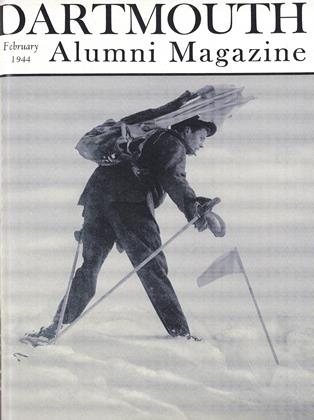DARTMOUTH'S 24111 annual lecture series on the Guernsey Center Moore Foundation took the form of a three-day symposium, January 7, 8 and 9, oh "Re-assessing the Functions of the Liberal Arts College." Guest speakers at three public afternoon lectures in 105 Dartmouth Hall were Dean Roscoe Pound, emeritus head of the Harvard Law School; Prof. Howard Mumford Jones, dean of the Harvard Graduate School of Arts and Sciences; and Dr. Reinhold Niebulir, noted religious leader and professor at Union Theological Seminary. In addition to the public addresses, the three speakers met with the Dartmouth faculty for evening discussions of the day's topic.
Dean Pound spoke on "Education for die Professions," Dean Jones on "The Student, the Teacher and the Scholar," and Dr. Niebuhr on "Moral and Spiritual Values in the Modern College."
In the opening address, Dean Pound took the position that one-sidedness in education is bad for both the individual and society and strongly advocated a full liberal arts preparation for professional studies in the graduate schools. "The highly trained specialist with only incidental culture is no asset to the world of today," he declared. Dean Pound traced the development from individual acquisitiveness to public service and responsibility as the guiding spirit of the professions, and declared that the key to this true professional spirit lies in the undergraduate college. He also urged a greater balance between the sciences and the humanities, and concluded with a statement of faith in the enlarged role of the liberal college in the postwar world.
Dean Jones, in the second lecture, defined scholarship as "the free play of mind over matter" and urged that true scholarship be brought out of the dusty corners of the library and laboratory and be kept before the masses of people. "The doctrine of scholarship must be publicly announced and recognized by the whole social community," he said.
Declaring that what the country needs is more people blessed with this spirit of scholarship, Dean Jones said, "To protect democracy we must protect the spirit of scholarship and free inquiry for the truth. But this is not enough. We must also protect and encourage all those who would engage in this free inquiry for truth."
In the third and final lecture, Dr. Niebuhr took the liberal arts college to task for not raising the ultimate issue of the meaning of life, and declared that it was afraid to raise this great issue because it either believed "that there is no answer or is afraid of a dogmatic answer." This, he asserted, has made for "a flatness and thinness in our culture" and at its worst has produced a dangerous cynicism. Supporting liberal education as the education of a free society, Dr. Niebuhr made a plea that to its values be added those which come only from the truth and ultimate answers of religion.
DR. EARL CRANSTON '16 of the University of Redlands, California, who returns to Dartmouth in July as Phillips Professor of Religion.
 View Full Issue
View Full Issue
More From This Issue
-
 Lettter from the Editor
Lettter from the EditorLetters from Dartmouth Men in the Armed Forces
February 1944 -
 Article
ArticleWOMEN OF DARTMOUTH
February 1944 By BILL CUNNINGHAM '19 -
 Article
ArticleTHE POSTWAR MAJOR
February 1944 By Harold E: B. Speight h'28, -
 Class Notes
Class Notes1918
February 1944 By ERNEST H. EARLEY, DONALD L. BARR -
 Class Notes
Class Notes1934
February 1944 By WILLIAM C. EMBRY -
 Article
ArticleBUTTERFIELD HALL
February 1944 By LEON BURR RICHARDSON 'OO
Article
-
 Article
ArticleCHICAGO PLANS NATIONAL DARTMOUTH POW-WOW
November 1923 -
 Article
ArticleAlumni Fund Green Derby Contests for 1942
January 1943 -
 Article
ArticleA Man's College?
January 1950 -
 Article
ArticleMasthead
October 1979 -
 Article
ArticleClass of 1997
May/June 2006 By Julie Sloane '99 -
 Article
ArticleThe Faculty
APRIL 1969 By WILLIAM R. MEYER


